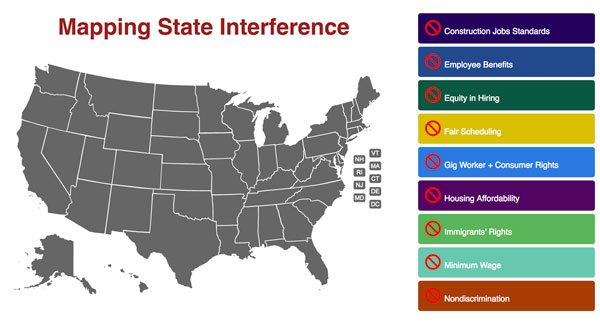
April 12, 2018; Next City
As the need for data to back up claims of discrimination and bias in public policy grows, so does the amount of publicly available resources. NPQ recently wrote about the opening of Eviction Lab, which has accumulated “approximately 80 million eviction records going back 18 years with the purpose of giving communities a means of comparing data, solutions, and policies on a city-by-city and county-by-county basis” via data and customizable maps and rankings. Joining these ranks, the Partnership for Working Families launched its new interactive map that shows where state laws block localities’ ability to raise the minimum wage, provide paid sick days, require local hiring, and other critical policies that can help close the inequality gap. It seems that with this and other readily available data, the information needed to change the landscape of poverty exists. But the policies that are emerging at the local, state, and national level tell another story. The question is why?
Going to the data sources provides some answers: Corporations and their lobbyists are driving deregulation at a rapid rate at all levels of government.
Most or all of the states that prohibit local standards related to wages, benefits, scheduling, construction jobs, or housing affordability have minimal or no state regulation related to those issues. In other words, while preemption advocates are rushing to establish ceilings on local standards, they aren’t also setting very many floors at the state level that guarantee minimum protections or standards.
Using tools such as the Partnership for Working Families’ interactive map confirms the proliferation of corporate funds and corporate influence in state legislatures. As Ben Beach and Miya Saika Chen from the Partnership report in an op-ed from Next City:
The fact that 28 states now prohibit local minimum wage standards and 27 states ban local rent control measures speaks to the effectiveness of this strategy. Recent research by our organization and the National Employment Law Project highlights Uber, Lyft and others’ aggressive lobbying and unprecedented spending to influence state legislators, which led, as noted, to 41 states adopting policies that preempt any local attempt at regulation.
Sign up for our free newsletters
Subscribe to NPQ's newsletters to have our top stories delivered directly to your inbox.
By signing up, you agree to our privacy policy and terms of use, and to receive messages from NPQ and our partners.
The map also reminds us of the systems of oppression present in our politics: overwhelmingly white, male state legislatures are readily adopting laws that harm women and people of color the most.
According to the most recent data from the National Conference of State Legislatures, state legislatures are, taken together, an astounding 76 percent male and 75 percent white. The two states on our map that preempted local authority on nearly every issue we tracked, Tennessee and Indiana, have legislatures that are almost entirely white and male.
[…]
The Partnership for Working Families has reported on seven overwhelmingly white state legislatures that acted to preserve Jim Crow racial wage gaps when they blocked majority African American cities from raising the minimum wage.
Similarly, when 20 predominantly white, male legislatures took away the ability of localities to require employers to provide earned sick time, their action disproportionately harmed women and people of color, who are overrepresented among low-wage workers and among workers whose jobs bring them into contact with sickness.
All of this leaves the nonprofit community data-rich but seemingly without a unified means of changing the picture to achieve greater equity. As the Partnership for Working Families indicates, knowing and understanding the political landscape is important, and their data and that of others serves as a strong platform for helping communities understand and organize. Many nonprofits can do much within their current scope of work—if they have the will and the leadership. The journey won’t be easy, but could be well worth the effort.—Carole Levine













